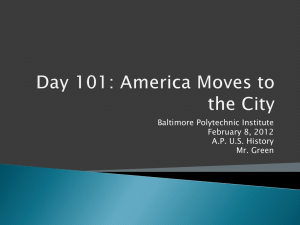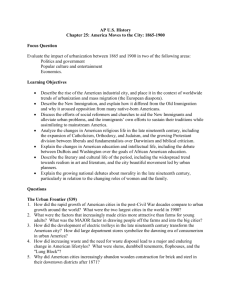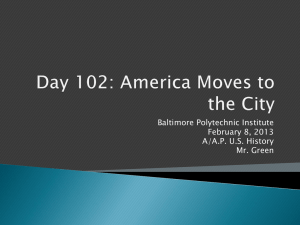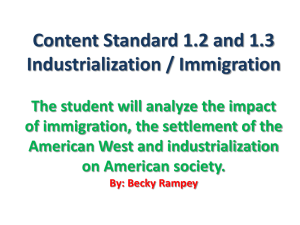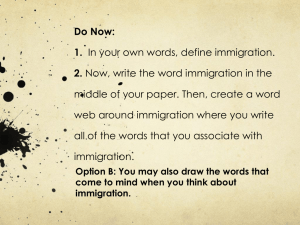Late Nineteenth Century Immigration
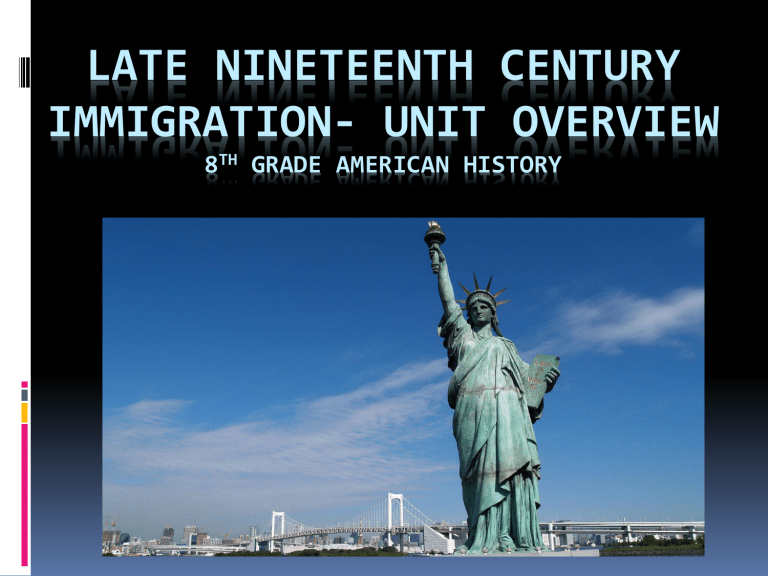
LATE NINETEENTH CENTURY
IMMIGRATION- UNIT OVERVIEW
8 TH GRADE AMERICAN HISTORY
NYS Learning Standards-
United States History
Key Idea 1: The study of New York State and United States history requires an analysis of the development of American culture, its diversity and multicultural context, and the ways people are unified by many values, practices, and traditions.
Performance Indicators: Student explore the meaning of American culture by identifying the key ideas, beliefs, and patterns of behavior, and traditions that help define it and unite all Americans.
Sample Tasks: Students will be able to describe how massive immigration, forced migration, changing roles for women, and internal migration led to new social patterns and conflicts; and identify ideas of national unity that developed amidst growing cultural diversity (Adapted from National
Standards for U.S. History).
NYS ELA Standards
Key Idea 2. Speaking and writing to acquire and transmit information requires asking probing and clarifying questions, interpreting information in one’s own words, applying information from one context to another, and presenting the information and interpretation clearly, concisely, and comprehensibly.
Performance Indicators:
Students produce oral and written reports on topics related to all school subjects establish an authoritative stance on the subject and provide references to establish the validity and verifiability of the information presented
Students develop information with appropriate supporting material, such as facts, details, illustrative examples or anecdotes, and exclude extraneous material
Students use the process of pre-writing, drafting, revising, and proofreading ( the “writing process”) to produce well constructed informational texts
Sample Tasks: Students will be able to write an essay for social studies that contains information from interviews, data bases, magazines, and historical texts.
Throughlines
During the late nineteenth century, were push and pull factors the same for immigrants emigrating to
America as they are today?
How did nineteenth century immigration affect the formulation of American society?
How would 21 st century views on immigrants and immigration be different if the “two great waves of immigration” had never occurred?
Generative Topics
Push and Pull Factors
Globalization
Discrimination
Persecution
Freedom
Unit-Long Understanding Goals
1. Students will learn about the push and pull factors that made late nineteenth century immigrants want to emigrate to America and build new lives.
2. Students will improve their understanding of discrimination, persecution and freedom by examining the historical struggles of various ethnic groups who sought new lives in America.
3. Students will improve their research skills, writing mechanics, and knowledge of MLA citation by completing an immigration research paper.
Overarching Unit Objectives
1. Students will analyze and interpret political cartoons, which focus on the discrimination that immigrant groups faced during the Great Wave of Immigration by answering key questions and participating in a full class discussion.
2.
Students will gain an understanding of the push and pull factors that contributed to late nineteenth century immigration by examining key vocabulary words and participating in interactive
PowerPoint lectures where the teacher poses a variety of didactic, reflective and affective questions meant to stimulate student interest and engagement.
3. Students will improve and hone their research and writing skills by researching a chosen immigrant group and writing a three paged typed essay complete with citation.
Lesson Walkthrough
Class 1 : Students will be introduced to their research projects and given a lesson on MLA citation, using classroom texts as practice.
Class 2: Students will learn about the two great waves of immigration in the late nineteenth century
Class 3: Students will learn about Jewish immigrants in America and complete step 1 of their research project: Answering their homework brainstorm questions about their chosen immigrant group, sitting in collaborative groups and using library resources.
Class 4:Students will learn about Italian immigrants and complete the second stage of their immigration project: peer editing rough drafts
Class 5: Students will bring in their final drafts and share with the class. Afterwards, students will learn about Chinese immigrants coming to Angel Island.
Class 6: Students finish up their discussion of Angel Island, watching a video about “Paper Relatives”. Students will then learn about
Mexican American immigration.
Ongoing Assessment
During this unit, the students’ immigration project is broken down into discrete parts that allow the teacher to offer them ongoing feedback and assess progress. The sequential nature of the project is beneficial for students and the teacher in that it allows for continual ongoing and formal assessment through a set of clear criteria using a structured rubric.
